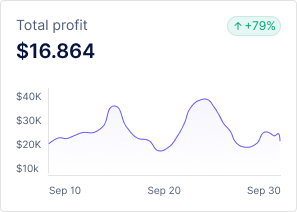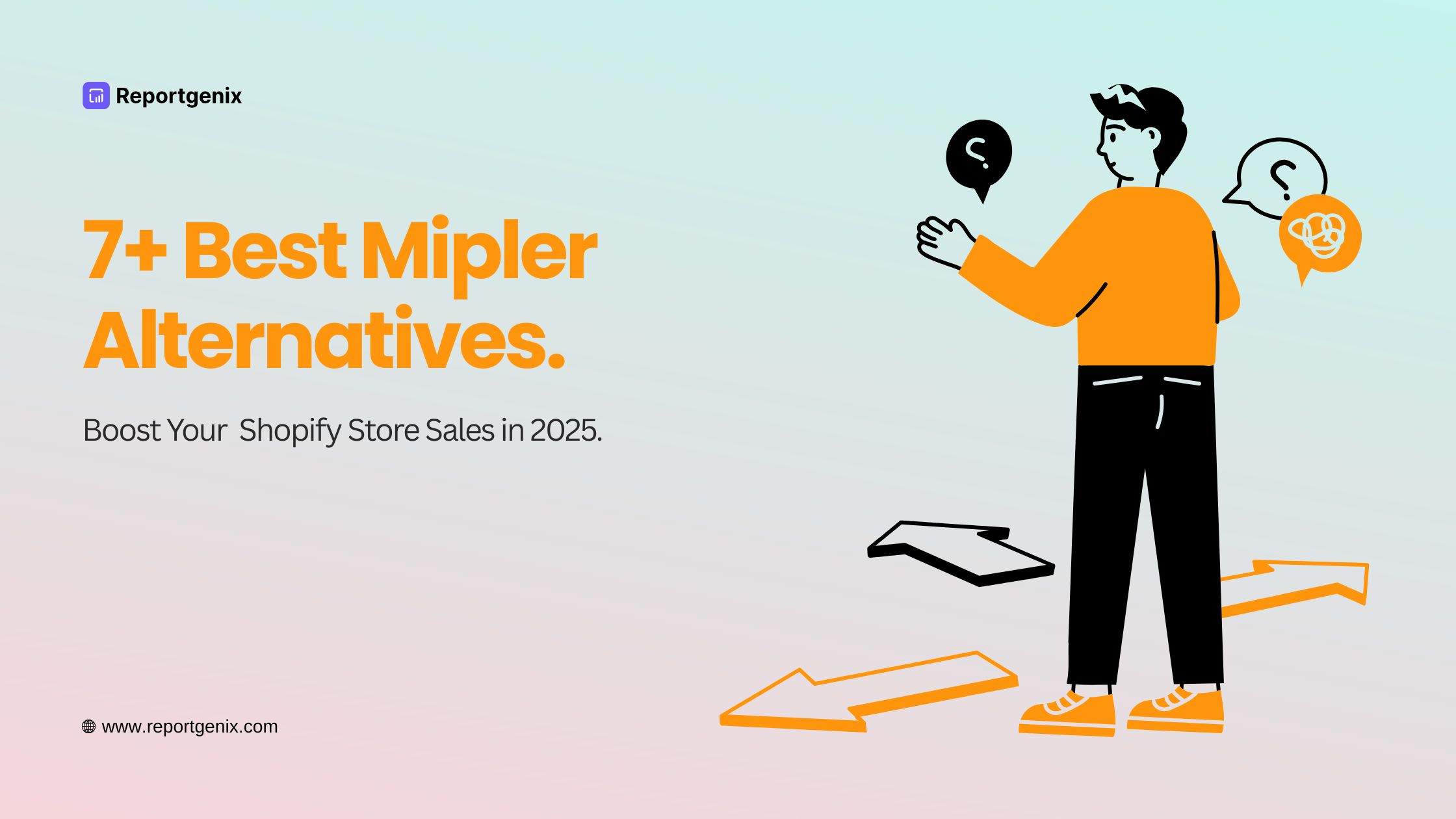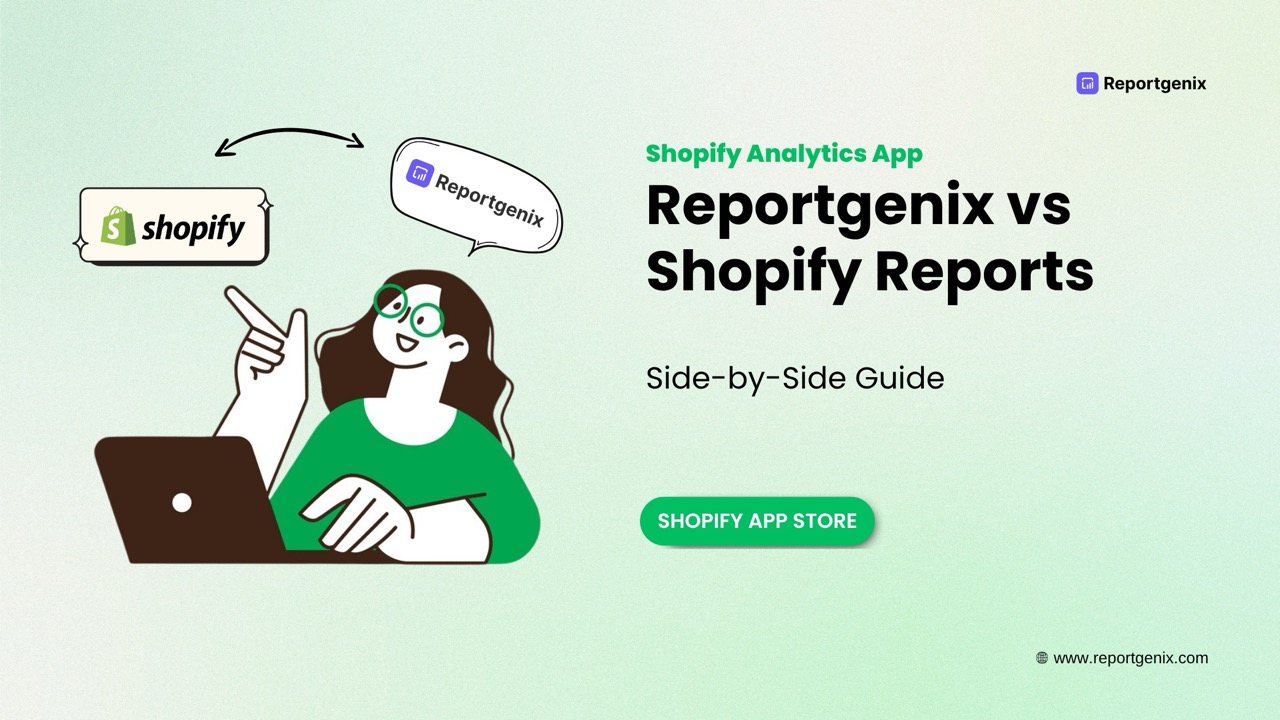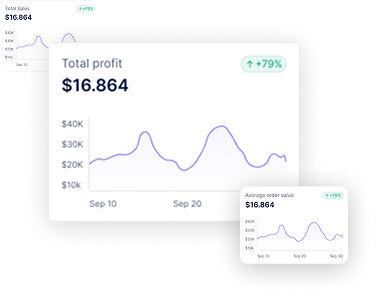Reportgenix vs Mipler: Which Shopify Reporting Tool Offers the Best Deal in 2026?
Get Summary On:
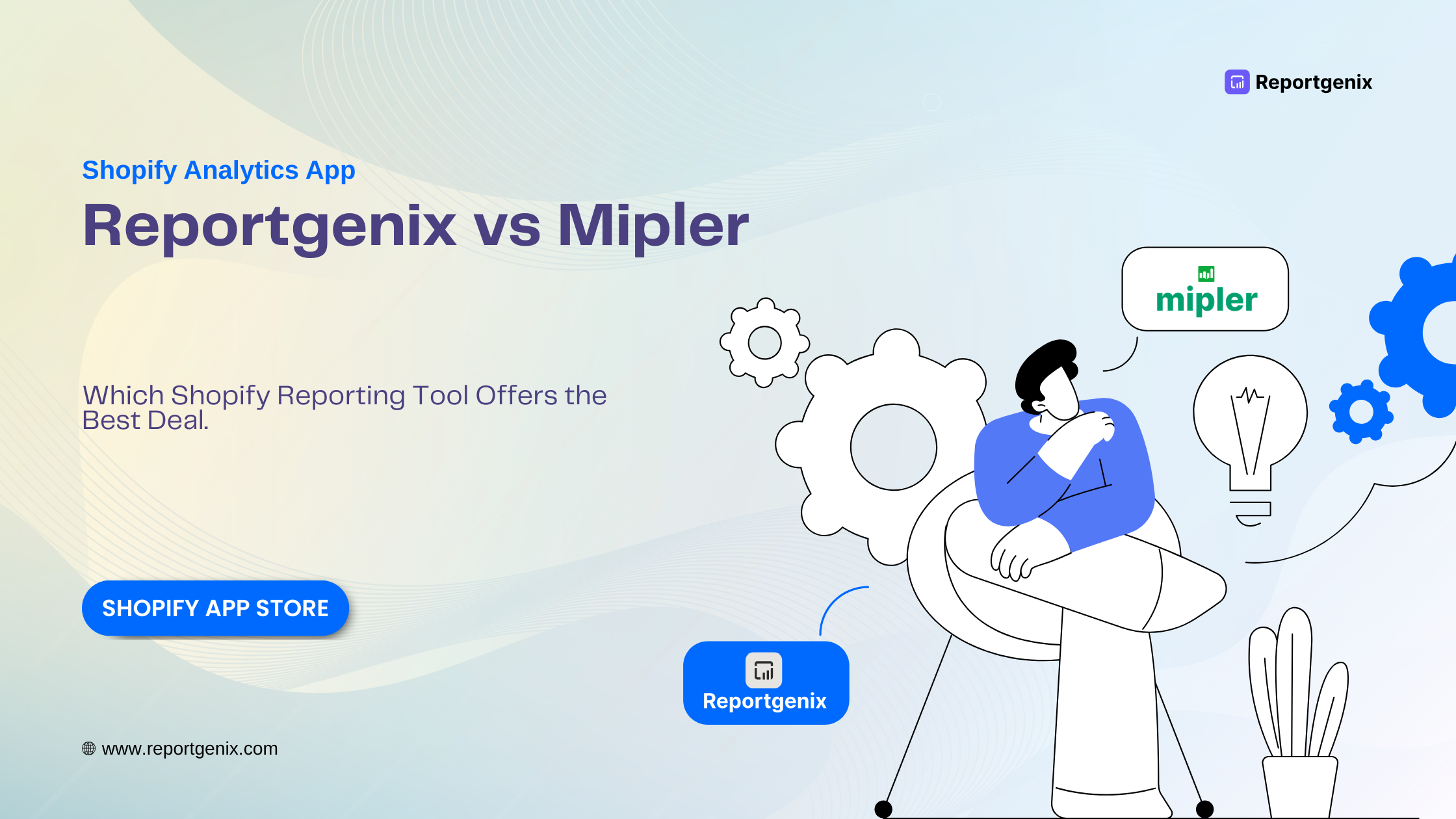
Tired of spending hours creating Shopify reports and looking for a report automation tool, but confused which one to choose? If yes, you are just at the right place.
In this article, I have analyzed and compared Reportgenix vs Mipler to help you pick the right report automation tool that delivers faster insights and smarter reporting.
So, why wait anymore? Let’s dig deep into our analysis:
| Quick Takeaways: Reportgenix Vs Mipler Reportgenix excels at AI‑driven insights, ready‑to‑use templates, and easy setup. These features make it ideal for small to medium stores. Mipler is great for custom reports, Google Sheets automation, and multi-store tracking, perfect for data-focused teams and bigger stores. |
Reportgenix – Quick Overview
Reportgenix is built to automate Shopify store reporting and analysis. It features powerful AI integration that understands natural language and generates real insights, taking information from your store in minutes.
Moreover, you are getting 100+ built-in report templates that make report generating much easier. Apart from these, Reportgenix integrates with Slack and email, which removes the hassle of downloading and automates report sharing.
Pros: Standout Features Of Reportgenix
- Intuitive interference and requires no technical knowledge to operate
- Has a natural language AI assistant for report generation
- 100+ customizable report templates
- Live Dashboards tracking revenue, orders, refunds & more
- Multi-Currency Support
- Integration with other tools, e.g., Slack, WhatsApp
- Report scheduling automation
- Affordable pricing
Cons: Drawbacks of Reportgenix
❌ No built-in multi-store dashboard
❌ Lacks direct Google Sheet sync
Mipler – Quick Overview
Mipler is an all-in-one reporting solution that fits any Shopify store of any size. With this application, you get a powerful tool for in-depth report analysis and customization with filtering and grouping features.
Besides, the automation feature of Mipler is praiseworthy. It integrates with Google Sheets and keeps your analytics updated automatically.
For large agencies or businesses that deal with multiple stores, Mipler is a great tool. You can store and generate analytics for different stores from a single platform.
Pros: Standout Features Of Mipler
- 60+ built-in report templates
- Deep customization and report analysis
- Supports multi-store
- Google Sheets integration
- Presents visual data: Bar, Column, Scatter, Linear, etc.
- Export report in versatile formats
- AI Assistant to auto-edit and create reports
- Automated email scheduling
Cons: Drawbacks of Mipler
❌ Steep learning curve
❌ Doesn’t support report generation based on natural language AI commands
❌ No built‑in Slack
❌ complex pricing model, and it is quite expensive for smaller stores
Reportgenix vs Mipler: Quick Feature Comparison
| Criteria | Reportgenix | Mipler |
| Best For | Small to medium Shopify stores | Multi-store or high-volume Shopify merchants |
| Leaning Curve | Minimal | High; need technical knowledge |
| AI-Powered Insights | ✅ | ✅ |
| Natural Language AI | ✅ | ❌ |
| Built-in Slack Integration | ✅ | ❌ |
| Built-in Reports Templates | 100+ | 60+ |
| Multi-Currency Support | Dedicated Built-in tool | Limited |
| Automation | Scheduled reportsAI support | Scheduled emails Exports |
| Google Sheets Integration | ❌ | ✅ |
| Multi-Store Reporting | ❌(Only Single-store reporting) | ✅ |
| Real-Time Data Access | ✅ | ✅ |
| Customer Segmentation | ✅ | ✅ |
| Export Formats | PDF, CSV, or Excel | XLSX, CSV, PDF, HTML, JSON |
| Free Plan Available | ✅ 90 days of data | ✅For under 1,000 lifetime orders |
| Pricing (Starter Plan) | $19.99/month | $14.99/month |
In-Depth Head-to-Head Comparison: Reportgenix vs Mipler
1. Natural Language AI
Reportgenix
Reportgenix offers you a GTP-style natural language AI, Genix AI. Here you can ask the AI in your usual language, and it will generate an analytical report for you in seconds!
The best part is that it not only provides you with insights in words, but you get a professional style instant reports with charts, insights, and data visualization. Thus, Repotgenix automates the reporting by collecting information from your history and saves you hours.

Mipler
Though Mipler has AI assistance, it doesn’t allow you to ask questions in natural English and get an actionable insight, as in Reportgenix.
However, Shopify AI MCP connects Claude AI to Mipler Reports, which enables you to ask questions in natural English and get answers from your real data. But it doesn’t offer you an automated, tailored report like Genix AI of Reportgenix.
| Winner: Reportgenix If you are looking for an AI report assistant for Shopify that will automatically generate reports of any aspect of your business, Reportgenix is surely the better option than Mipler. |
2. Learning Curve
Repotgenix
If you are looking for a user-friendly and easily accessible interface, Repotgenix is unbeatable! You are getting a clean dashboard and a simple UI that requires zero technical knowledge to operate the application.
Additionally, the drag-and-drop feature makes report building quicker and hassle-free. It is more beginner-friendly and straightforward when we compare Repotgenix vs Mipler.
Mipler
Mipler also has a drag-and-drop feature like Reportgenix; it indeed has more advanced filters. But the problem here is that the interference of Mipler is more feature-densed which makes the user feel the interference more complex.
| Winner: Reportgenix For beginners, Reportgenix is more user-friendly. The feature-dense interference of Mipler seems more technical, and users require a steep learning curve to use it. |
3. Custom Report Builder
Repotgenix
With Reportgenix, you get a drag-and-drop feature that allows you to filter data from your Shopify store by any dimension you need. You can choose your preferred data visualization: charts, graphs, or tables.
The pre-built report templates, moreover, allow you to generate reports instantly. All templates Repotgenix provides are fully customizable and allow you to add filters, change metrics, and adjust visualizations. Besides, you can save custom reports as templates and reuse them anytime.
Thus, the Reportgenix custom report builder provides you with quick, visual, and actionable custom reports without technical setup.
Mipler
Mipler allows you to create custom columns with more business-specific calculations and advanced filtering with nested conditions (AND/OR). supports more complex features.
Additionally, Mipler custom reports have 1,000+ predefined columns and formulas with which you can create powerful and formula-based reports.
However, though the custom reporting of Mipler is very strong, the drawback here is that the intensive features make the report building more complex and technical.
| Winner: Tie Considering the custom reporting feature and facilities, Mipler offers more advanced and deep customizations. But when it comes to easy and quick custom report building, Reportgenix wins- and here is the tie. If you are looking for straightforward and quick custom report generation, choose Reportgenix, and if advanced reporting is your preference, go for Mipler. |
4. Built-in Report Templates
Reportgenix
Reportgenix has 100+ built-in report templates that are ready-to-use with minimal setup requirements. This is an excellent deal for merchants who want fast insights without much configuration.
Mipler
Mipler has 60+ built-in templates for sales, finances, inventory, and more. These templates support deeper analysis and customization facilities for specific business needs. However, they need additional setup to tailor incomparision to Reportgenix.
| Winner: Reportgenix Reportgenix offers more template options compared to Mipler. Though Mipler offers more detailed and deep customization, it requires extra setup to go into action. In contrast, Repotgenix offers more ready-to-use templates and a simple customization process. |
5. Multi-Store Support
Reportgenix
Reportgenix is designed for a single store supporting. That is, it excels at reporting and analytics for one store at a time, which makes it ideal for small businesses and single-store merchants.
Mipler
If you are running an agency or have multiple stores to work on, Mipler stands out with its multi-store support. Although this feature is only available in the highest tier of Mipler, it’s very helpful if you run more than one shop or operate in multiple regions.
| Winner: Mipler Mipler supports multi-store, but Reportgenix is designed only for a single store. Though Mipler is the winner here, not every Shopify store requires this feature. Multi-store support is required for agencies and large brands that have multiple stores. If you are not among this group, Reportgenix is good to go. |
6. Multi-Currency Support
Reportgenix
This application includes built-in multi‑currency reporting. That is, the interactive dashboard of Reportgenix displays multi‑currency values directly in reports and lets you track global sales performance.
Thus, Shopify merchants selling products in different regions can see all currency metrics clearly and consistently with Reportgenix.
Mipler
Though Mipler supports multi‑currency, it is done via Shopify’s data integration. Meaning, it uses Shopify’s native multi‑currency data (i.e., orders, payments, etc.) within its reports and dashboards. But it doesn’t currently have a special built‑in multi‑currency dashboard or automatic conversion feature.
| Winner: Reportgenix The multi-currency feature of Mipler is Shopify data-dependent; it doesn’t have a built-in currency conversion feature. In this aspect, Reportgenix wins the deal as it has integrated a multi-currency tool and provides consolidated currency insights to merchants who are selling globally. |
7. Automation
Reportgenix
Reportgenix allows you to automate daily, weekly, or monthly sales report scheduling. Thus, you get Shopify analytics in your inbox without any manual hassles.
Moreover, Reportgenix integrates with Email and Slack, and the report is automatically pushed to Slack at the scheduled time. Therefore, you need not take the hassle of downloading, emailing, or manual sharing.
Apart from these, Reportgenix has real-time alerts that send you instant notifications when sales drop, spike, or hit your revenue goals. This way, you can easily automate workflow with Reportgenix and save your hours.
Mipler
The automation features of Mipler are stronger with Google Sheets automation. You can easily export reports to Google Sheets with scheduled updates and ensure your reports stay in sync automatically.
Beyond basic scheduling, Mipler custom reporting workflows are integrated into external tools. Additionally, Mipler’s automation supports flexible export formats such as CSV, Excel, PDF, and Sheets, making your reporting much more flexible.
| Automation Type | Reportgenix | Mipler |
| Scheduled email reports | ✅ | ✅ |
| Recurring automated report run | ✅ | ✅ |
| Auto Slack messaging delivery | ✅ | ❌ |
| Google Sheets auto sync | ❌ | ✅ |
| Custom schedule configuration | ✅ | ✅ |
| Automation from templates | Simple setup | Powerful (with Sheets & exports) |
| Winner: Tie Both Reporteneix and Mipler automate key workflows, but each emphasizes different strengths. Reportgenix excels in Slack integration and simplicity, which makes it great for teams who want ready-to-go automated reports. In contrast, Mipler offers flexible exports and Google Sheets automation, ideal for merchants who integrate reporting with other tools. |
8. Best-Fit Use Case
Reportgenix
This application is mainly designed for small to medium stores that require AI automation for quick action. Reportgenix suits best for teams that prefer pre-built templates, AI suggestions, and Slack/email delivery.
Mipler
Mipler is best for multi-store or high-volume Shopify stores that require in-depth custom reports, automation, and Google Sheets integration. Data-driven merchants and analysts choose Mipler for their store analysis.
| Winner: Tie Both the platform fits best for different use cases. Reportgenix supports single-store and is ideal for small to medium size store. In contrast, Mipler supports multi-store and is great for high-volume Shopify stores. |
9. Pricing
Reportgenix
It offers you a free forever plan to test core features with 90 days of data history. Besides, you are getting a customizable dashboard, filter, graphs, and up to two schedules for the email report for free.
For paid plans, Reportgenix offers you three pricing options:
- Basic plan at $19.99/mo
- Advance plan at $39.99/mo
- Plus plan at $99.99/mo
Mipler
The pricing model of Mipler is not as simple as that of Reportgenix. The complexity and confusion arise with the Mipler two-layer price model.
- Shopify Plan: Basic, Shopify (Grow), Advanced, and Shopify Plus.
- Mipler Feature Tier: Starter, Basic, Optimal, or Advanced. The price of each tier differs for varying Shopify plans. For instance, for the Basic Shopify plan, the Starter Mipler plan costs $14.99/month; whereas for Shopify(Grow), the cost for the same tier rises to $39.99/month.
However, it also has a free plan that supports up to 1000 orders and gives access to 60+ built-in reports.
| Winner: Reportgenix Mipler has a complex pricing model in comparison to the straightforward Reportgenix price. Besides, considering the money value, Reportgenix is the winner. How? The Basic plan of Reportgenix offers up to 10 custom reports only at $19.99/mo. Whereas, spending $24.99/month to $129.99/mo, you will get only three custom reports with the Mipler Basic plan. Thus, Reportgenix is more affordable and offer ethe best money value. |
Similarities Between Reportgenix & Mipler
Both Reportgenix and Mipler have the core features in common, which are as follows:
- Shopify-focused reporting tools
- Custom report creation & filtering
- Scheduled email reports
- Export reports (CSV, Excel, PDF)
- Automation of recurring reports
- Interactive dashboards
- Multi-currency support
- Mobile-friendly interface
- Scalable with store growth
Reportgenix vs Mipler: Shopify App Store Ratings & Reviews
Before picking between Reportgenix and Mipler, it is crucial to check the ratings and user experience.
Reportgenix Review & Rating

Reportgenis has a 5-star rating on Shopify with zero negative user reviews. Primier Store (USA-based) has shared a genuine review on using Reportgenix as follows:
“Reportgenix has completely changed how I manage my store data. The 100+ready -made reports save me hours every week, and the AL insights help me make smart decisions quickly. Exporting to Excel and using Slack integration makes teamwork easy. Custom dashboard let me track sales, inventory, and customer trends effortlessly.”
- Primier Store (USA)
Mipler Review & Rating

Mipler also has a 5-star rating on the Shopify App Store and has many good reviews. For instance, ‘The Varsity’ from the United States, with almost three years of using the app, shared a positive report, as follows:
“Robust reporting platform. Lots of useful canned reports and excellent support with questions. Very satisfied.”
- The Varsity (USA)
However, some users have given three or even one star, sharing their bitter experience with Mipler. For instance, ‘Benefit Meals’ from the USA shares its bad experience, stating:
“Is not compatible with iOS. Can not look at reports on my phone, which, as a business owner, is unfortunate.”
- Benefit Meals (USA)
Which One Should You Choose: Reportgenix vs Mipler?
Reportgenix and Mipler has varying strengths. Therefore, know your needs and understand which is best for what requirements:
When to Choose Reportgenix?
- Need quick, AI-powered insights for Shopify data
- Prefer pre-built, ready-to-use templates
- Want Slack/email report delivery
- Easy setup with minimal configuration
- Focused on actionable dashboards for teams
When to Choose Mipler?
- Need deep custom reports with advanced filters and formulas
- Want Google Sheets automation & integration
- Run multi-store or high-volume Shopify reporting
- Require complex analytical workflows
- Prefer flexible exports and data manipulation
Closer: Reportgenix vs Mipler- The Best Reporting Tool
Analysing Reportgenix vs Mipler, it is clear that both the app has its individual strengths. For instance, Reportgenix wins for quick AI-generated customized reports, natural language AI, Slack integration, easy interference, and affordable pricing.
In contrast, Mipler has strong points for its extensive, deep custom reports with advanced filters and formulas, Google Sheets integration, complex analytics, and multi-store or high-volume Shopify reporting.
Therefore, between Reportgenix and Mipler, which one to choose depends on your needs and Shopify store type. Analyze your requirements, compare the features of the two applications, and select one that fits your needs best.
Nevertheless, for powerful AI, quick and straightforward report generation, Reportgenix is absolutely the best pick!
FAQs
Does Reportgenix offer a free plan?
Yes, Reportgenix offers a free plan for stores with up to 999 orders in six months, making it perfect for early-stage brands or those testing new tools.
Does Mipler offer multi‑store reporting?
Yes – Mipler supports multi‑store dashboards and consolidates data across stores, while Reportgenix currently focuses on single‑store analytics.
Does Reportgenix integrate with Google Sheets?
Currently, Reportgenix does not support Google Sheets integration. However, data can be exported manually for external analysis.
Is Reportgenix better than Mipler?
Reportgenix excels for single‑store teams needing fast, AI‑powered insights at a lower cost (starting $4.99/mo). Mipler, starting at $14.99, is built for advanced multi‑store reporting and sheet integration. See full comparison.

